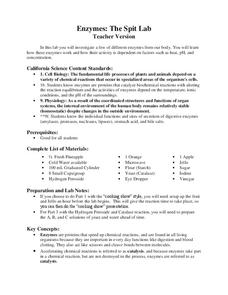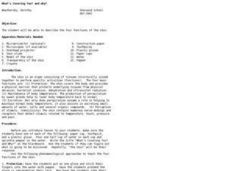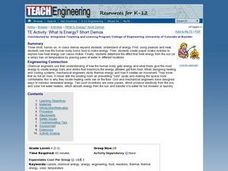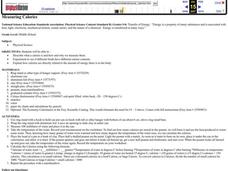LABScI
Enzymes: The Spit Lab
Enzymes in our bodies each have a job to do. Learn the factors that affect the activity of some enzymes using the third activity of an informative 12-part biology series. A three-part laboratory activity asks teams to investigate how...
Curated OER
Water in Earth's Hydrosphere
Environmentalists test stream water for temperature, pH, and turbidity. Each group shares their information and then the class makes an overall evaluation of the water quality. A slide show sets the backdrop for the teaching portion and...
Polar Trec
Calorimetry Lab
Young people between the ages of 11–13 need on average about 2,000 calories per day. Within the lab, groups learn about calorimetry and respiration. They explore how it pertains to humans and animals living the Arctic where cold...
Curated OER
Fall 2003 Midterm Exam #3
Let there be light! When your physics learners take this midterm exam, light will be their focus. They will show what they know about electromagnetic waves, interference, refraction, reflection, lenses, prisms, and more! The test is...
Curated OER
Chemistry of Carbon
After giving basic details about the properties of carbon, some of the common functional groups and molecules are featured. There is some information about specific functions and impact on the human body. The diagrams are helpful and...
Curated OER
Chemistry of Carbon: Building Blocks of Life
After giving basic details about the properties of Carbon, some of the common functional groups and molecules are featured. There are some details about specific functions and impact on the human body. The diagrams are helpful and could...
Howard County Schools
Maria’s Quinceañera
How long will it take to save up for a car? Classmates use linear and exponential models to see how money received during a Quinceanera will grow over time.
Curated OER
Measure Me!
Third graders use nonstandard concrete methods to estimate and record measurements of their body.
Curated OER
How to Read a Thermometer
Students' temperature is measured using an instrument called a thermometer.
Curated OER
Stop the Bleeding
Students explore various parts of the heart and blood vessels . They begin with an overview of the components of the cardiovascular system. They see a cross section of an artery and watch how a blood clot develops.
Mr. E. Science
Stars, Galaxies and the Universe
It takes 225 million years for our sun to travel around the galaxy. The presentation covers astronomical units, light years, telescopes, types of stars, the life cycle of a star, and types of galaxies. This is the last lesson in a...
Curated OER
Metamorphosis Magic
Students make different motions for each stage in the butterfly life cycle and plant a garden. In this butterfly life cycle lesson plan, students can take the mini gardens home and discuss how butterflies help gardens.
Curated OER
Easily Confused Words: Role and Roll
Do your kids confuse role and roll? Discuss the difference with them, show them the example sentences provided, and have them take the short quiz that follows.
Curated OER
Microwave Telescopes
Discovery of microwaves and other trivia starting this PowerPoint will help interest your class in the application and behavior of these radio waves. Great images to show real-life experiments and equipment help understanding of how the...
Curated OER
Animal Skin
Students investigate the skin surface to body area ratios for different animals. In this seventh/eighth grade mathematics/science lesson, students explore heat transfer between an animal’s body and the environment. Using technology,...
Curated OER
What's Covering You? and Why?
Students take a closer look at human skin. In this biology lesson plan, students describe the four functions of the skin as they complete a hands-on activity.
Curated OER
Preparing for the Weather
Students discuss hypothermia and recognize how insulation helps keep people warm. In this science lesson, students get into four groups and go to each activity. Students simulate what it is like to stay warm using shortening and ziploc...
Curated OER
What Is Energy? Short Demos
Students engage in three short, hands-on, in-class demos which expand students' understand of energy. First, using peanuts and heat, students see how the human body burns food to make energy. Then, they create paper snake mobiles to...
Curated OER
Water Pollution Lesson Plan: All Messed Up
Students map and calculate the area of the school parking lot and then the volume of water falling on the school parking lot. They map the route surface runoff will take to the nearest water body and describe the roles that human...
Curated OER
What's in the Water?
Students make a water sampler and use proper techniques to collect water.They write a essay explaining the inter-relationship of factors such as temperature, pH, dissolved oxygen, nitrates, and phosphates in a lake that might cause a...
Curated OER
Measuring Calories
Learners investigate what a calorie is and how and why we measure them. They conduct an experiment to compare the calories of a peanut and a mini-marshmallow, and explain and discuss how calories are directly related to the amount of...
Curated OER
Freshwater Habitats
Students take samples from local freshwater sources and examine them for macroinvertebrate life. They take samples from both shallow and deep freshwater environments, measure temperatures, and classify organisms found in their samples.
Curated OER
Salinity
Students take a provided ocean Trivia Quiz in order to start a discussion of the ocean. They then perform an experiment on how the amount of salt in the ocean affects it and varies from ocean to ocean.
Curated OER
Water on Planetary Surfaces
In this water on planetary surfaces worksheet, students read about the Galileo spacecraft and the surface of Jupiter's moon Europa. They read about the energy needed to keep the water in a liquid state on Europa. Students solve 4...

























